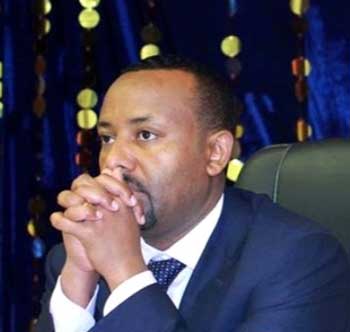
In 1974 the Derg, a Marxist-Leninist military junta, deposed Emperor Haile Selassie of Ethiopia. It then subjugated the nation to tyranny until the Ethiopian People’s Revolutionary Democratic Front (EPRDF), created in 1989 as a guerrilla movement, removed it from power in 1991. However, the EPRDF simply replaced the dictatorship of the Derg with its own and has had two Prime Ministers ruling the country since then, Meles Zenawi (23 August 1995 till his death on 20 August 2012) and Hailemariam Desalegn (20 August till his effective resignation on 2 April 2018).
These Prime Ministers enforced their rule through repression, state-sponsored terrorism, and various undemocratic practices. For example, the May 2005 election in Ethiopia was hailed to be the first truly competitive multi-party election in that country but instead turned out to be marred by post-election violence that led to no less than 200 deaths and tens of thousands of arrests.

The last Ethiopian PM Hailemariam Desalegn, “stepped down in February [2018] amidst ongoing civil and political unrest across the country.” He was replaced by Abiy Ahmed, 41, the current PM and a person with surprising gifts.
The new Prime Minister seems to have taken stock of the political situation in the country and has adopted policies that show that his Government intends to take a new path, a more democratic one, in the way the EPRDF governs Ethiopia. Abiy Ahmed, in a very short space of time, has moved to normalise relations with rival Eritrea, build stronger ties with regional neighbours like Egypt and Kenya, liberalise the economy, boost community cohesion and has released of tens of thousands of political prisoners.
Himself a lieutenant colonel in the Ethiopian National Defense Force before joining parliament in 2010, Abiy Ahmed is an insider of the regime and understands the extent to which the armed and security forces have been engaged in using repression to enforce the rule of his predecessors. Therefore, his response to a “challenge about the constitutionality and legality of some of [his]…actions, particularly the release of thousands of prisoners accused of terrorism, …that terrorism is not just an act of trying to forcefully overthrow a government… [but also includes] government’s unconstitutional use of force to stay in power should also be considered terrorism,” seems to show that he is genuine in his reforms.
However, on 23 June 2018, a grenade was thrown and killed a number of people during a rally organised to show support for him and his policy changes. Elsewhere, leaders have used such events as an excuse to enforce or reinforce dictatorship. So far, Abiy Ahmed has not shown signs of budging from his reforms as a result of the attack.
Abiy Ahmed stands as a new dawn for Ethiopia’s democracy. He is beginning to be seen as a beacon of hope for the future of democracy, peace and stability in Africa and beyond. His push for more freedoms in Ethiopia can be expected to go a long way to improve Ethiopia’s democracy. Coupled with the friendship he is knitting with neighbours, Abiy Ahmed can help advance peace and stability in the East African Region and in the Horn of Africa.
Leave a Reply